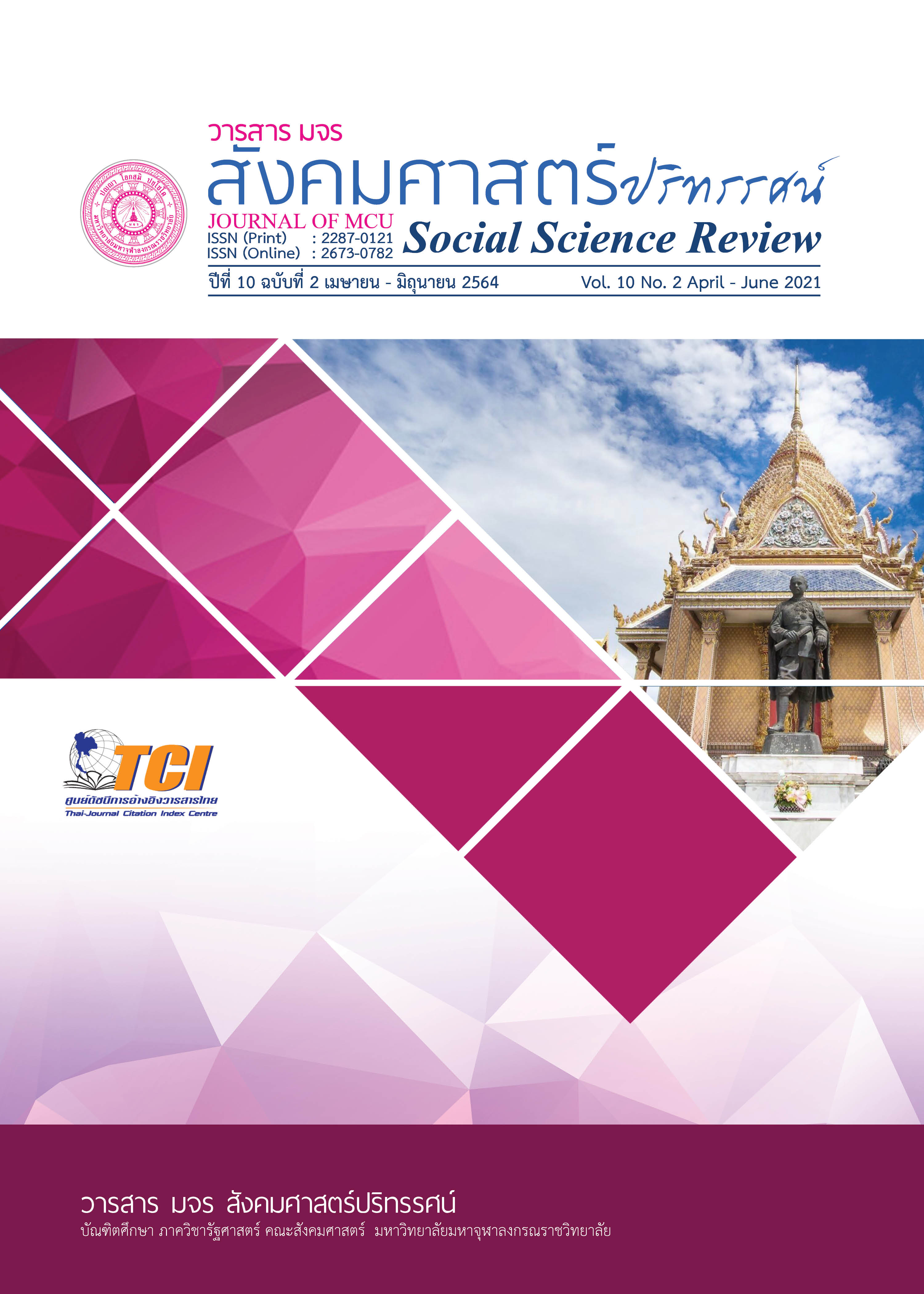การพัฒนาโมเดลความสัมพันธ์เชิงสาเหตุการบริหารจัดการศูนย์เรียนรู้ชุมชนภายในวัด จังหวัดพระนครศรีอยุธยา
คำสำคัญ:
การพัฒนา, การบริหารจัดการ, ศูนย์เรียนรู้ชุมชนภายในวัดบทคัดย่อ
บทความนี้มีวัตถุประสงค์เพื่อ 1) ศึกษาปัจจัยที่มีผลต่อการบริหารจัดการศูนย์ฯ
2) พัฒนากรอบโมเดลการบริหารจัดการศูนย์ฯ 3) พัฒนาโมเดลความสัมพันธ์เชิงสาเหตุการบริหารจัดการศูนย์ฯ วิจัยแบบผสานวิธี ได้แก่ การวิจัยเชิงคุณภาพ สัมภาษณ์เชิงลึกผู้ให้ข้อมูลสำคัญ 22 รูปหรือคน การวิจัยเชิงปริมาณ กลุ่มตัวอย่าง 450 คน เครื่องมือวิจัย คือ แบบสัมภาษณ์และแบบสอบถาม วิเคราะห์ข้อมูลเชิงคุณภาพใช้การวิเคราะห์เนื้อหาและข้อสรุปแบบอุปนัย วิเคราะห์ข้อมูลเชิงปริมาณใช้สถิติบรรยาย วิเคราะห์สหสัมพันธ์และตรวจสอบความตรงของโมเดลและขนาดอิทธิพลทางตรงทางอ้อมด้วยโปรแกรมสำเร็จรูปทางสังคมศาสตร์
ผลการวิจัยพบว่า 1) ปัจจัยที่ส่งผลต่อการบริหารจัดการศูนย์ฯ ประกอบด้วยการบริหารจัดการ ปัจจัยสนับสนุน และภาวะผู้นำ 2) กรอบโมเดลที่พัฒนาขึ้นประกอบด้วยตัวแปรแฝงภายนอก 2 ตัว คือ การบริหารจัดการ และปัจจัยสนับสนุน ตัวแปรแฝงภายใน 2 ตัว คือ ภาวะผู้นำและการพัฒนา 3) โมเดลมีความสอดคล้องกับข้อมูลเชิงประจักษ์ มีค่าไค-สแควร์ 50.00 องศาอิสระ 38 ความน่าจะเป็น .092 ค่าดัชนีวัดความกลมกลืน .942 และค่าดัชนีรากกำลังสองเฉลี่ยของค่าความแตกต่างโดยประมาณ .026 อธิบายความแปรปรวนของการพัฒนา ได้ร้อยละ 77.30 ได้รับอิทธิพลทางตรงจากการบริหารจัดการ ปัจจัยสนับสนุน และภาวะผู้นำ มีขนาด -.130, .735 และ .342 ตามลำดับ ได้รับอิทธิพลทางอ้อมจากการบริหารจัดการ และปัจจัยสนับสนุน ผ่านตัวแปรภาวะผู้นำ มีขนาด .106 และ .160 ตามลำดับ และตัวแปรภาวะผู้นำ ได้รับอิทธิพลทางตรงจากการบริหารจัดการ และปัจจัยสนับสนุน มีขนาด .309 และ .466 ตามลำดับ อย่างมีนัยสำคัญทางสถิติที่ระดับ .01
เอกสารอ้างอิง
กรกต ชาบัณฑิต. (2561). พุทธธรรมธิปไตย. วารสาร มจร สังคมศาสตร์ปริทรรศน์, 7(2), 239-246.
กรมการพัฒนาชุมชน. (2551). คู่มือศูนย์เรียนรู้ชุมชน ฉบับประชาชน. กรุงเทพฯ: กรมการพัฒนาชุมชน.
จักรวาล สุขไมตรี. (2562). การบริหารงานตามหลักสังคหวัตถุ 4 ขององค์การบริหารส่วนตำบลพะตง อำเภอหาดใหญ่ จังหวัดสงขลา. วารสารราชพฤกษ์, 17(2), 105-111.
เฉลิมศักดิ์ ศิริพันธุ์. (2555). การศึกษาปัจจัยที่มีผลต่อการเพิ่มประสิทธิภาพการผลิตของเกษตรกรศูนย์เรียนรู้เศรษฐกิจพอเพียงชุมชนในเขตปฏิรูปที่ดิน. (รายงานการวิจัย). กรุงเทพฯ: สำนักงานการปฏิรูปที่ดินเพื่อเกษตรกรรม กระทรวงเกษตรและสหกรณ์.
ปัญญา จันทโคตร และกุลธิดา ท้วมสุข. (2558). ปัจจัยที่สนับสนุนความสำเร็จในการดำเนินงานของศูนย์เรียนรู้ชุมชนในประเทศไทย. วารสารวิจัย สมาคมห้องสมุดแห่งประเทศไทย, 8(1), 42-52
พรชัย กิตติชญาน์ธร. (2555). รูปแบบและการขับเคลื่อนการบริหารศูนย์การเรียนรู้ของชุมชนในการป้องกันปัญหายาเสพติด : ศึกษากรณีชุมชนธรณีคำ แขวงโคกแฝด เขตหนองจอก กรุงเทพมหานคร (วิทยานิพนธ์ปรัชญาดุษฎีบัณฑิต สาขาพัฒนาสังคมและการจัดการสิ่งแวดล้อม). กรุงเทพฯ: สถาบันบัณฑิตพัฒนบริหารศาสตร์.
พระครูประภัศร์ธรรมาภิรักษ์. (2562). การบริหารสถานศึกษาตามหลักสังคหวัตถุ 4 ในสถานศึกษาขั้นพื้นฐาน สังกัดสำนักงานเขตพื้นที่การศึกษาประถมศึกษาชัยภูมิ เขต 1. วารสารวิชาการแสงอีสาน มหาวิทยาลัยมหามกุฎราชวิทยาลัย วิทยาเขตอีสาน, 16(1), 154-167.
พระเอกลักษณ์ อชิโต. (2563). บทบาทพระสงฆ์กับงานสาธารณสงเคราะห์ภายใต้สถานการณ์การแพร่ระบาดของไวรัส Covid19: กรณีศึกษาบทบาทของหลวงพ่อแดง นนฺทิโย
วัดอินทาราม จ.สมุทรสงคราม. วารสาร มจร สังคมศาสตร์ปริทรรศน์, 9(3), 289-304.
สุภัทรชัย สีสะใบ. (2563). การพัฒนาโมเดลประสิทธิผลพุทธวิธีการบริหารจัดการศูนย์เรียนรู้ชุมชนการเกษตร. วารสารสังคมศาสตร์และมานุษยวิทยาเชิงพุทธ, 5(2), 197-210.
อาคม เดชทองคำ. (2554). วัดในบริบทของสังคมไทยในอดีต ปัจจุบันและอนาคต. นครศรีธรรมราช: มหาวิทยาลัยราชภัฏนครศรีธรรมราช.
Hair, J.F. et al. (1998). Multivariate Data Analysis, 5th ed. New Jersey: Prentice Hall.
ดาวน์โหลด
เผยแพร่แล้ว
รูปแบบการอ้างอิง
ฉบับ
ประเภทบทความ
สัญญาอนุญาต
ลิขสิทธิ์ (c) 2021 วารสาร มจร สังคมศาสตร์ปริทรรศน์

อนุญาตภายใต้เงื่อนไข Creative Commons Attribution-NonCommercial-NoDerivatives 4.0 International License.
เพื่อให้เป็นไปตามกฎหมายลิขสิทธิ์ ผู้นิพนธ์ทุกท่านต้องลงลายมือชื่อในแบบฟอร์มใบมอบลิขสิทธิ์บทความให้แก่วารสารฯ พร้อมกับบทความต้นฉบับที่ได้แก้ไขครั้งสุดท้าย นอกจากนี้ ผู้นิพนธ์ทุกท่านต้องยืนยันว่าบทความต้นฉบับที่ส่งมาตีพิมพ์นั้น ได้ส่งมาตีพิมพ์เฉพาะในวารสาร มจร สังคมศาสตร์ปริทรรศน์ เพียงแห่งเดียวเท่านั้น หากมีการใช้ภาพหรือตารางหรือเนื้อหาอื่นๆ ของผู้นิพนธ์อื่นที่ปรากฏในสิ่งตีพิมพ์อื่นมาแล้ว ผู้นิพนธ์ต้องขออนุญาตเจ้าของลิขสิทธิ์ก่อน พร้อมทั้งแสดงหนังสือที่ได้รับการยินยอมต่อบรรณาธิการ ก่อนที่บทความจะได้รับการตีพิมพ์ หากไม่เป็นไปตามข้อกำหนดเบื้องต้น ทางวารสารจะถอดบทความของท่านออกโดยไม่มีข้อยกเว้นใดๆ ทั้งสิ้น





